Intermittent fasting is not just a trendy word—it’s a powerful tool that’s been backed by science and practiced for centuries. Whether you’re looking to boost metabolism, lose weight, or support overall health, IF can offer serious benefits. But like any health strategy, it’s does’nt suits with all size.
In this fasting health guide, we will demystify the intermittent fasting benefits, possible risks, and how to start safely.
What Is Intermittent Fasting?
Intermittent fasting is an eating regimen that involves cycling between periods of eating and fasting.
Some of the most popular IF methods are:
- 16:8 Method: 16 hours fasting, 8-hour eating window
- 5:2 Diet: Eat normally for 5 days, restrict calories (500–600) for 2 non-consecutive days
- Eat-Stop-Eat: 24-hour fast once or twice a week
- Alternate-Day Fasting: Fast every other day
Intermittent Fasting Benefits
1. Fat Burning
Fasting naturally reduces calorie intake and enhances fat-burning hormones like norepinephrine and human growth hormone.
2. Improved Insulin Sensitivity
IF may reduce blood sugar levels, which can make it easier to treat or avoid type 2 diabetes.
3. Improved Brain Function
It encourages BDNF (brain-derived neurotrophic factor), which helps to maintain cognitive health and sharpness.
4. Cellular Repair & Longevity
Fasting triggers autophagy—a mechanism by which your body removes old, damaged cells and replaces them with healthier ones.
5. Lower Inflammation
Intermittent fasting has also been associated with reduced levels of inflammation and oxidative stress.
How to Do Intermittent Fasting without Causing any harm
Beginning IF isn’t rocket science, boss. Here’s how to transition in like a pro:
- Start Slow: Start with a 12:12 or 14:10 window, and then transition to 16:8 gradually.
- Stay Hydrated: Have plenty of water, herbal tea, or black coffee during fasting periods.
- Break the Fast with Nutrition: Eat high-protein, fiber-dense, and whole-food meals when your eating window is open.
- Be Consistent: Adhere to your selected window every day for optimal results.
- Listen to Your Body: If you become dizzy, extremely tired, or irritable, re-evaluate your method.
Potential Intermittent Fasting Risks
Though IF is a godsend for some, it isn’t for everyone. Be watchful of these intermittent fasting risks:
- Nutrient Deficiency: Missing meals may result in suboptimal consumption of vital nutrients if not managed properly.
- Hormonal Disruption: Women, particularly, might face changes in menstruation or hormonal imbalance.
- Overeating in Eating Window: Some overeat during their eating window as a reaction after fasting, and this negates the benefits.
- Not Suitable for Everyone: Avoid IF if you’re pregnant, have an eating disorder history, or suffer from certain medical conditions—consult a healthcare provider first.
Expert Tips for Fasting Success
- Plan your meals ahead of time
- Focus on quality over quantity
- Avoid ultra-processed foods
- Track how your body responds
- Stay active, but avoid intense workouts while fasting initially
Intermittent fasting is a gentle yet potent health strategy with demonstrated advantages—from weight reduction to healing on the cellular level. But do it the right way, based on informed awareness and attention to your body’s specific needs.
Saksham Kaushik is a talented writer and knowledge seeker who enjoys studying and sharing knowledge on everyday happenings, trends, and interesting facts. With keen observation skills and a curiosity-based approach, He analyzes heavy subjects into simple-to-read articles, keeping readers updated and interested. From international updates to technology breakthroughs, lifestyle suggestions, and food for thought, Saksham Kaushik provides new insights and useful information every day.




